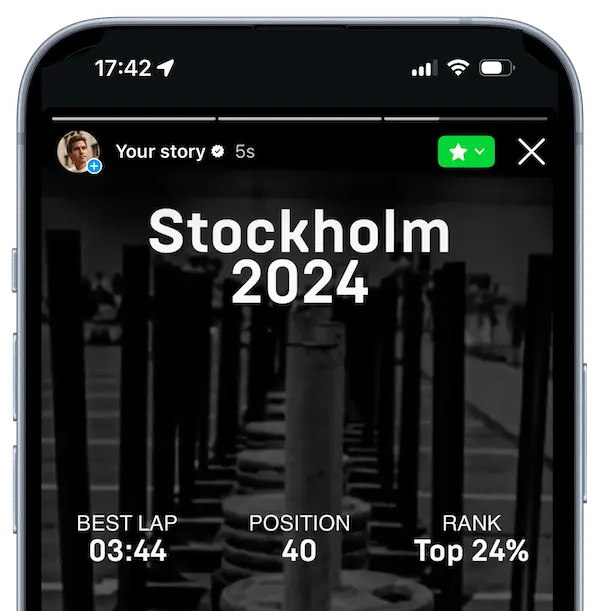Baczmanski Adrian
Performance Analysis
Dive into this athlete’s performance at 2024 Glasgow using our in-depth report. By comparing their results to those of similar athletes, we identify key strengths and areas in need of improvement.
For this specific race, our analysis is based on the performance of
1000 similar athletes.
Race Summary
This chart provides a visual summary of the race performance, displaying percentile rankings for all running and workout segments. You can quickly see the strength and the weakness of the athlete.
Percentile based on all the athletes who competed in Hyrox Men
Running
We compare the athlete's running times with peers who have similar finish times.
This chart helps you quickly determine if your running pace was too fast or too slow for your overall finish time.
Based on 1000 athletes with similar finish time in Hyrox Men
Workouts
We compare the athlete's workout times for each station with peers who have similar finish times.
This chart helps you quickly identify if any workouts were too fast or too slow relative to your overall finish time.
Based on 1000 athletes with similar finish time in Hyrox Men
Pacing Quality
This section showcases the entire Baczmanski Adrian's performance at each station and run segment compared to the average.
It reveals strengths and areas for improvement, providing insights into how the athlete's times stack up against typical HYROX competitors with same finish time.
In HYROX racing, pacing is crucial. The pacing line highlights Baczmanski Adrian's pacing strategy, identifying segments where they may have started too fast or too slow, guiding them toward a more balanced race approach.
Based on 1000 athletes with similar finish time in Hyrox Men
Spread of Splits Time
This chart illustrates the spread of splits of all athletes competing in the same division, providing a visual representation of the distribution of times for each split.
Use this chart to compare the Baczmanski Adrian's performance against the competition, identifying areas of strength and those needing improvement.
This chart includes Top 10%, Top 25%, Top 50%, Top 75%, Top 90%, and Top 100% of the athletes. The outliers have been removed for clarity.
Percentile based on all the athletes who competed in Hyrox Men
Improvement Plan
Based on our analysis, here are the focus areas for improvement. The goal is
to determine how quickly the athlete could improve on some stations and where is the path of least resistance to improve Baczmanski Adrian's time.
The percentile rank is the current position of the athlete compared to the competition. It goes from 0 to 100, where 0 is the best and 100 is the worst.
It show the potential improvement for each station. The athlete should focus on the stations with the highest potential improvement and the biggest duration.
A big improvement in the Farmer's carry station will not be as impactful as a small improvement in the wall ball station for instance.
Just click on a station to see how easy it will be to improve and how important it is to focus on it during training.
For this athlete we identified a possible improvement of
07:43.
Check the detail of the improvement plan below.
03:15
Potential Improvement
42.1%
Focus During Training
Percentile based on all the athletes who competed in Hyrox Men
A word from RoxCoach - Your AI Powered Trainer
Overall Performance:
Adrian Baczmanski's performance in the 2024 Glasgow HYROX race places him in the top 67% overall and top 72% in his age group, showcasing a commendable effort among a competitive field. A standout aspect of Adrian's race was his total running time, which was 02:58 faster than average, indicating a strong runner profile. This suggests that while Adrian excels in running, he may benefit from a more balanced focus on strength training to complement his running prowess. His pacing appeared to start slower in the initial running segment but improved significantly as the race progressed, demonstrating strong endurance and recovery capability. However, to reach a higher competitive level, it is imperative to address areas of weakness, particularly in strength-focused challenges.
Segments to Improve:
- Wall Balls: Adrian's performance in Wall Balls was significantly slower than average, indicating a potential lack of power and endurance in lower body and shoulder muscles. To improve, consider incorporating exercises like squats, thrusters, and medicine ball throws into training routines. Focus on explosive power and coordination between lower body and arm movements. Also, practice wall ball specific drills, gradually increasing the weight and duration to build endurance.
- Sandbag Lunges: The time taken for Sandbag Lunges suggests a need for enhanced lower body strength and stability. Targeted exercises such as weighted lunges, step-ups, and Bulgarian split squats can help build leg muscles and improve balance. Incorporating plyometric workouts like box jumps will also improve explosive strength, beneficial for quicker, more efficient lunges.
- Burpees Broad Jump: A slower performance in this segment might indicate a lack of explosive power and coordination. To address this, focus on plyometric exercises like box jumps, broad jumps, and burpees without weights to improve explosiveness. Additionally, interval training combining burpees with sprints can enhance cardiovascular endurance and recovery speed between jumps.
- Sled Push: Although not the weakest, improvement in Sled Push can contribute significantly to overall performance. Strengthening the posterior chain through deadlifts, farmer's walks, and sled drags can provide the necessary power. Practicing the actual sled push with varying weights and distances will also ensure better technique and efficiency.
For all the above exercises, focus on form and gradually increase intensity to prevent injuries. Incorporating compromised running scenarios, where Adrian practices running immediately after these strength exercises, will simulate race conditions and improve his transition and recovery times between segments.
Race Strategies:
- Start Strong but Steady: Given the tendency to start slower, focus on a strong yet sustainable pace from the beginning. Warming up dynamically before the race can help activate the muscles and improve initial performance.
- Transitions and Recovery: Improving Roxzone time suggests that transition and recovery between exercises can be optimized. Practice quick transitions in training, focusing on breathing techniques and swift movement from one exercise to the next.
- Mid-Race Assessment: At the midpoint, assess energy levels and adjust pace accordingly. If feeling strong, gradually increase the pace, especially in strength segments where Adrian has shown slower times.
- Endurance Focus: Given Adrian's running strength, maintaining a steady pace in running segments can conserve energy for strength exercises. However, do not hold back too much; use running as an opportunity to make up time.
Implementing these tailored training routines, focusing on specific areas of improvement, and applying strategic race strategies will help Adrian Baczmanski elevate his performance in future HYROX races. Balancing his evident running abilities with strength training will make him a more well-rounded and competitive athlete.
Ready to conquer your next race?
Unlock your potential with our pace calculator tool, designed to help you craft your ideal race splits and propel yourself to new heights.
Pace Calculator

